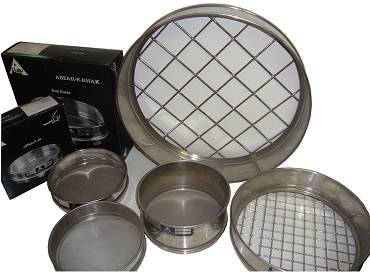Laboratory sieve

Testing Sieves…
A Measuring Device
Particle size separation by screening was first conceived by man in his efforts to produce metals from the earth. References to sieving are found back as far as history goes, but the first definite information is found in written descriptions of mining methods by the Greeks and Romans about 150 years B.C. They describe the sieve as planks or hides punched full of holes or woven from horse hair, reeds or even human hair.
In the 15th Century, the Germans introduced the first screens woven from wire thus showing the first signs of improvement over the very crude forms previously used. Crude wood frame hand shaken riddles were first used, but through the years the introduction of power driven screening machinery greatly increased the capacity of screened materials.
As crushing and screening methods improved, more accurate means of comparing screened materials
were needed in order to measure products being sold. The use of woven wire screen fitted into a suitable frame put particle size classification on a practical basis. Testing sieves of this type opened the door to the study of particle size distribution and measurement down to as fine as 25 microns or approximately 1/1000 of an inch, with literally millions of particles being measured in each test.
Industry soon established specifications based on testing sieve meshes and even though the early testing sieves did not have any particular relationship between the openings and the sieve cloth was not woven to today's standards of precision, they proved their usefulness.
As testing sieves became more generally used, there developed a demand for better accuracy and a definite relationship between the openings. This led to the development and introduction of the Tyler Standard Screen Scale Sieve Series which provided the means of controlling the work of crushing, grinding and screening equipment at its most efficient and profitable level.
Other sieve series were proposed in the following years and these will be briefly discussed in a later chapter.
|